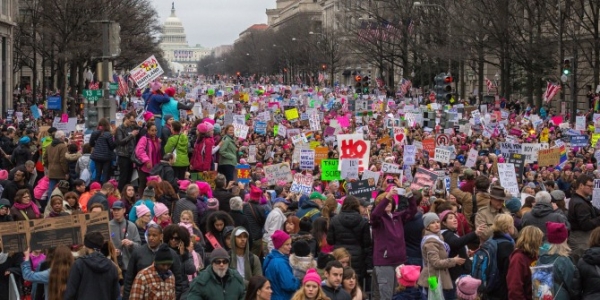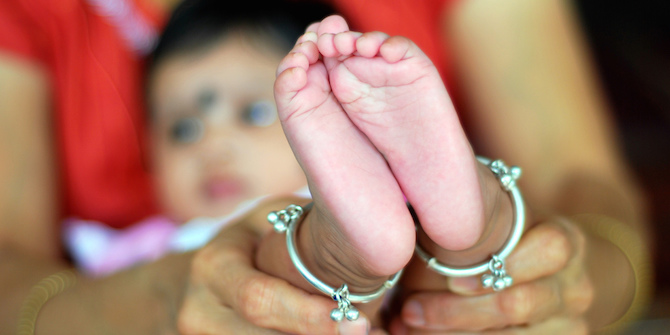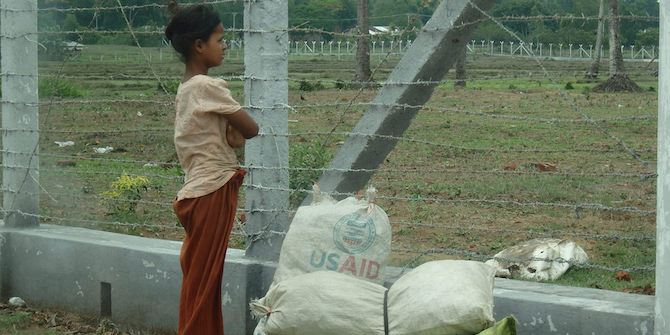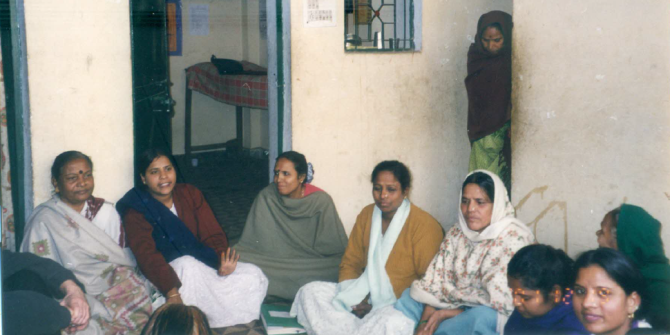 There has been remarkable and quantifiable progress for Bangladeshi women since the country became independent in 1971, particularly in terms of women’s political representation. But Tasmiah Rahman draws on her own professional research and personal experiences to argue that the connection between women in power and empowerment of women is missing.
There has been remarkable and quantifiable progress for Bangladeshi women since the country became independent in 1971, particularly in terms of women’s political representation. But Tasmiah Rahman draws on her own professional research and personal experiences to argue that the connection between women in power and empowerment of women is missing.
The Women’s March on Washington gathered millions of people together in the US and countries all over the world to protest against Donald Trump’s presidency. As I saw tweets and Facebook updates in solidarity with this protest, I wondered what this means for women of Bangladesh in the local context.
Protests are not new for Bangladeshis and women have actively participated in all major protests that the country has seen; be it the Language movement, Independence in 1971 and recently the Shahabag Movement. But women have not received due credit in historic movements and even though they were part of them, I cannot think of any exclusive women’s movements that demanded equality, security and self-respect. But do we need such a movement?
Women in power
Women’s rights and issues of gender mainstreaming have been in the forefront of government’s agenda for the past decade. NGOs in Bangladesh have also worked towards women’s rights issues in grassroots level. The country leads in gender equity rating in achieving access to better health and education support when compared with neighbouring countries. Bangladesh is ranked 72 among 144 countries in the world in the Global Gender Gap Index 2016 prepared by World Economic Forum. In addition, women are also holding more political positions now than ever before. The country’s Prime Minister Sheikh Hasina is ranked 36, amongst 100 powerful women by Forbes. The opposition leader and the speaker are both women. Apart from the important political positions, women’s parliamentary representation is about 20 per cent, ranking the country 8th among Asian countries.
So, there seems to be remarkable and quantifiable progress for Bangladeshi women. But if we look at the struggles of women in everyday lives, are we able to conclude that women are better off because there are women in power?
Violence against women, sexual harassment, and deaths
The daily news is flooded with stories of women being raped and killed on a regular basis. According to Ain o Shalish Kendro, a legal aid and human rights organisation, from January to December 2016, there were 724 reported case of women being raped, of which 37 died and 16 committed suicide as a result of the rape across Bangladesh. In the same period, 191 women were murdered by their husbands, 148 women have been harassed while 4 committed suicide as they could not bear the harassment and 34 were attacked with acid. In addition to the physical abuse, mental torture remains unreported or underreported as institutions are still insensitive in dealing with such issues.

Reports of stalking and subsequent threats are also numerous. Stalkers often roam around free even after harming not only the girl but her family members as well. In November 2016 for example a man maimed the father of the girl, and then continued to threaten her. Often family members are too afraid to even come forward with issues of stalking and threats, and even when they do the police can be slow or unwilling to respond.
Laws are there, but they don’t do much
Bangladesh has ratified CEDAW in 1981 and there are laws in place, such as the Domestic Violence Act in 2010 and Women and Children Act 2000 (amended in 2003) covering several public and private acts of violence. But the responsible institutions often fail to follow through when it comes to enforcing the law properly and imposing punishment. Women are still blamed for ‘inviting’ stalkers or violence; their outfits and behaviour are still scrutinised as key causes. Furthermore, services to provide mental support to the victim and her family are largely absent from government institutions.
There are also significant barriers to women participating in the legal process. In an interview with the Daily Star last year Sara Hossain, a Barrister in the Supreme Court of Bangladesh, said that there are many women lawyers in the country but most of their family members are not supportive of their career choices. It is still not acceptable for women to return home late from work and they are expected to juggle between family and work responsibilities. Nor is the professional environment particularly welcoming for the women lawyers who do continue to work.
Women’s everyday lives
Even aside from the targeted incidents of physical and mental abuse, women in Bangladesh face scrutiny every day both at home and on the streets. Living in this country for almost all of my life and working on gender issues, I have experienced first-hand this day-to-day reality, and heard countless testaments from friends, colleagues and participants in my field of work.
Women are teased in broad daylight for how they look and what they wear. Their bodies are squeezed and touched. Many of the young girls I interviewed in the field said they had taken up wearing the hijab to avoid harassments on the streets. Flocks of garment workers will walk to their workplaces together as they are less likely to be disturbed when they are in a group. My friends who work have said that people stare at their breasts while talking to them. At checkpoints, the policemen often stare at my body when I open the window while they complete their usual security checks.
At home, even if women are ‘allowed’ to work they still remain responsible for household chores and are considered the primary caregivers. Mothers teach their daughters to be independent thinkers, but after the rules change when they get married and they are expected to defer to their husbands and his family. Many women will give up their jobs to stay at home and take care of the children and in-laws, but even then they are still criticised for not doing enough. There are more and more cases of divorce in Bangladesh where the husband and his family expected the wife to take on a ‘homemaker’ role, but the woman has continued to pursue her career.
Even though women leaders are running the country and are present in the political arena, they have not done enough to change the situations of women’s everyday lives in micro spaces. This is due to the fact that leaders have not challenged patriarchy. The Prime Minister, being a woman in her secured position has not improved the security issues of women on streets and at home. Even though the country focuses on investing in women through income access and education, their security is not guaranteed. Let us hope that the newly elected city mayor, Selina Ivy will be more effective in making real changes in terms of security for women. She has come from grassroots level and was reelected against strong opposition from her own political party. Known for her diligence, she has brought about positive changes in the city of Narayanganj, about 24 kilometers from Dhaka city.
The untold fact is while thousands of female garment workers go to work every morning, the majority of them think major decisions in households should be taken by men. Micro credit loans are given to women, but how they will be used is still invariably decided by men. At public places, we hardly hear stories of women raising voice against abuse and harassment. The majority still shy away from complaining, assuming that it will create more difficulties for themselves and their families. As a result, the change is not radical, and is taking generations to alter the mindset of people towards women’s position in the society. The leaders are seen in isolation. The connection between women in power and empowerment of women is missing.
I await that day when women will march in the streets of Dhaka, claiming for a better environment, better services, better behaviour from the society where their children grow knowing that women have equal rights. I wait for that day, patiently.
About the Author
 Tasmiah Rahman recently graduated from LSE with an MSc in Social Policy and Development. She is currently working as a Senior Manager, Monitoring Results Measurement and Communications in an international NGO in Bangladesh.
Tasmiah Rahman recently graduated from LSE with an MSc in Social Policy and Development. She is currently working as a Senior Manager, Monitoring Results Measurement and Communications in an international NGO in Bangladesh.
Tasmiah is a regular contributor to South Asia @ LSE. Read her previous posts here.







